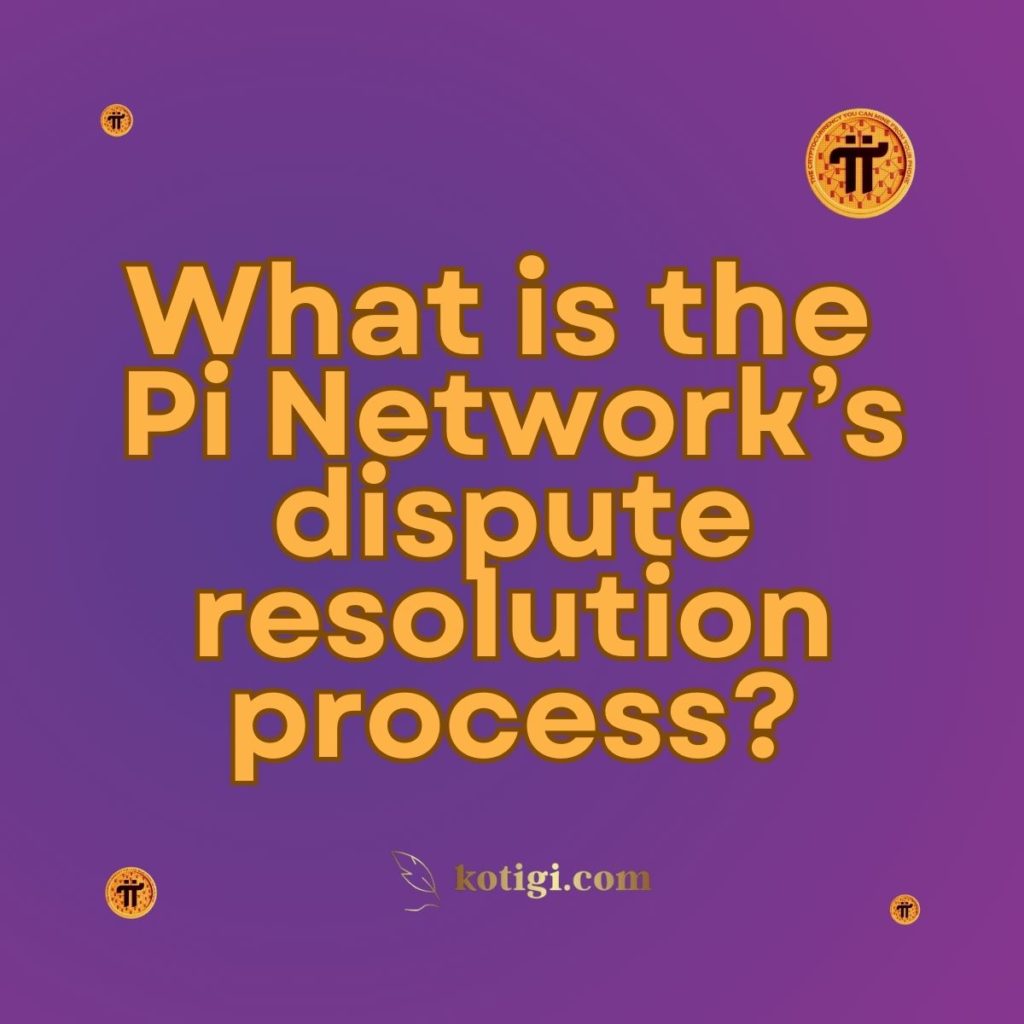
What is the Pi Network’s dispute resolution process?
Pi Network’s dispute resolution process is built around initial direct negotiations, followed by binding arbitration, and includes a class action waiver. Users must attempt to resolve disputes informally before escalating to arbitration, ensuring a structured, fair process. For more details about the topic, click check Pi Network Terms of Service here.
Introduction
As Pi Network continues to grow in popularity, the platform has developed a clear and structured dispute resolution process to address any disagreements that may arise between users and the company. Ensuring transparency and fairness in conflict resolution is essential in maintaining user trust, particularly in a decentralized platform like Pi Network. The process outlined in Pi Network’s Terms of Service emphasizes resolving disputes through informal negotiations before resorting to binding arbitration. This article explores how Pi Network manages disputes, arbitration policies, and the rights of users to ensure smooth operations.
1. Initial Dispute Resolution
Before any formal arbitration or legal proceedings can take place, Pi Network encourages users to engage in direct discussions to resolve disputes. This step is designed to foster mutual understanding and agreement without resorting to litigation or arbitration, allowing parties to maintain amicable relationships.
1.1 Importance of Informal Negotiation
Pi Network places significant emphasis on informal negotiation as the first step in the dispute resolution process. By encouraging users to engage in direct communication, the platform aims to resolve issues quickly and efficiently, without escalating the situation.
1.2 Conditions for Formal Arbitration
If the informal dispute resolution process does not yield results within 30 days, the parties involved are allowed to proceed to formal arbitration. This condition ensures that both parties have exhausted all possible avenues for mutual resolution before seeking legal remedies.
1.3 Promoting Transparency and Communication
Open dialogue between users and Pi Network can foster transparency and help clarify misunderstandings early on. By promoting direct communication, Pi Network works to minimize the number of disputes that escalate into more serious conflicts.
2. Binding Arbitration Process
If the initial dispute resolution process fails to resolve the issue, Pi Network resorts to a binding arbitration process. This approach is defined by the platform’s Terms of Service, which specify that arbitration will be the exclusive method for resolving disputes.
2.1 Role of American Arbitration Association
The arbitration process is administered by the American Arbitration Association (AAA), using its Commercial Arbitration Rules. This ensures that the process adheres to well-established guidelines, giving users confidence in the fairness of the proceedings.
2.2 Arbitrator’s Authority and Decision
The arbitrator plays a crucial role in determining the outcome of the dispute, with the authority to resolve all disputes related to the interpretation and enforceability of Pi Network’s Terms of Service. Their decision is final and binding, meaning that users must abide by the ruling.
2.3 Relief Granted Through Arbitration
The arbitrator has the power to grant relief that would typically be available in a court of law. This means that users can expect a fair resolution through arbitration, which would otherwise require a lengthy court process.
3. Class Action Waiver
An important component of Pi Network’s dispute resolution process is the class action waiver, which prevents users from filing or participating in class-action lawsuits.
3.1 Prohibition on Class Actions
Under the class action waiver, users can only bring claims against Pi Network in their individual capacity. This prevents the aggregation of claims into large lawsuits, streamlining the resolution process.
3.2 Impact of Waiver on Legal Rights
By agreeing to the Terms of Service, users waive their right to file or join a class action. While this may limit collective legal recourse, it ensures that disputes are handled more efficiently on an individual basis.
3.3 Enforcement of Class Action Waiver
If a court or arbitrator finds that the class action waiver is unenforceable, the arbitration provision as a whole becomes null and void. This ensures that class action claims are either resolved individually or not at all.
4. Exceptions to Arbitration
While arbitration is the primary method for resolving disputes on Pi Network, there are notable exceptions. Certain disputes, such as those involving intellectual property, may be resolved through traditional litigation.
4.1 Intellectual Property Claims
Disputes related to intellectual property rights, including patents, copyrights, and trademarks, are not subject to the arbitration requirement. This allows either party to pursue litigation in court to protect their intellectual property.
4.2 Small Claims Court
For minor disputes, users can seek resolution through small claims court, bypassing the arbitration process. This offers a quicker, simpler route for resolving smaller issues without incurring the costs of formal arbitration.
4.3 Alternative Legal Remedies
In addition to arbitration, Pi Network allows for alternative legal remedies, depending on the nature of the dispute. This ensures that users retain access to appropriate avenues for resolving conflicts.
5. Arbitration Location and Jurisdiction
The binding arbitration for Pi Network takes place in California, specifically in San Mateo County, as outlined in its Terms of Service. Users are required to submit to this jurisdiction when engaging in the arbitration process.
5.1 Arbitration Location: California
Binding arbitration is held in California, which may affect users from other regions. Pi Network stipulates that users agree to this location when they accept the platform’s Terms of Service.
5.2 Legal Jurisdiction and Enforcing Arbitration
By submitting to the jurisdiction of federal or state courts in California, users agree to accept any ruling related to compelling arbitration, modifying arbitration decisions, or enforcing judgments.
5.3 Service of Process and Legal Notifications
Users also agree to accept service of process by mail, meaning that Pi Network can serve legal notifications directly via postal service, streamlining the process.
6. 30-Day Opt-Out Clause
Pi Network provides users with a 30-day window to opt-out of the arbitration and class action waiver provisions. This allows users some flexibility if they wish to pursue other methods of dispute resolution in the future.
6.1 Opting Out of Arbitration
Users who do not wish to be bound by the arbitration and class action waiver clauses can opt out within 30 days of first using Pi Network’s services. This ensures that users are not automatically subject to arbitration.
6.2 How to Opt Out
To opt out, users must send an email to Pi Network’s support team within the 30-day window. The email serves as official notice that they do not consent to arbitration, and Pi Network will not enforce these clauses against them.
6.3 Consequences of Opting Out
While opting out frees users from arbitration, it also removes Pi Network’s obligation to resolve disputes through arbitration, meaning future disputes may need to be settled in court.
7. Changes to Dispute Resolution Terms
Pi Network retains the right to make changes to its dispute resolution policies, but it must provide users with at least 60 days’ notice before changes take effect.
7.1 Notice of Changes
If Pi Network plans to modify its dispute resolution procedures, users will receive a 60-day notice. This ensures transparency and allows users time to review and adjust to new terms.
7.2 Prospective Application of Changes
Changes to dispute resolution policies apply prospectively, meaning they will only affect claims made after the change has taken effect. This protects users from retroactive changes to their legal rights.
7.3 User Consent to Updated Terms
By continuing to use the platform after changes take effect, users consent to the updated terms. If users disagree with the changes, they may choose to stop using Pi Network services.
8. Governing Law
The governing law for Pi Network’s dispute resolution process is the State of California, ensuring consistency with local legal standards.
8.1 California Law as the Governing Jurisdiction
All disputes and interpretations of Pi Network’s Terms of Service are governed by the laws of the State of California. This provides a clear legal framework for resolving disputes.
8.2 Conflicts of Law Provisions
California law applies without regard to conflicts of law provisions, ensuring that users and Pi Network operate under the same legal standards regardless of their geographic location.
8.3 Precedence of Governing Law
In cases of conflict between California law and international laws, California law takes precedence for any disputes involving Pi Network’s terms or services.
Conclusion
Pi Network’s dispute resolution process is centered around transparency, fairness, and efficiency. By prioritizing initial informal discussions, followed by binding arbitration and a class action waiver, Pi Network ensures that disputes are resolved quickly and fairly. The platform’s users also have the option to opt-out of arbitration within 30 days, providing flexibility in their approach to dispute resolution. With clear guidelines and a strong legal foundation in California, Pi Network’s dispute resolution policies protect both users and the platform, ensuring a safe and compliant environment for all participants.
Key Takeaways
- Pi Network prioritizes informal negotiation before engaging in formal dispute resolution processes.
- Binding arbitration is the primary means of resolving disputes, conducted under the American Arbitration Association.
- Users are prohibited from participating in class actions, which must be resolved individually.
- Intellectual property claims and small claims court cases are exceptions to arbitration.
- Users can opt-out of arbitration and class action waivers within 30 days of using the service.
- Any changes to dispute resolution policies come with a 60-day notice, applying only to future claims.
- California law governs Pi Network’s dispute resolution process, providing a consistent legal framework.





